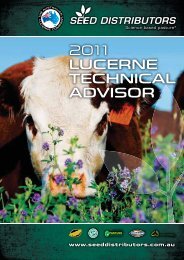Lentil variety sowing guide 2012 - Seed Distributors
Lentil variety sowing guide 2012 - Seed Distributors
Lentil variety sowing guide 2012 - Seed Distributors
Create successful ePaper yourself
Turn your PDF publications into a flip-book with our unique Google optimized e-Paper software.
40<br />
Chickpea <strong>variety</strong> <strong>sowing</strong> <strong>guide</strong> <strong>2012</strong><br />
By Larn McMurray Research Scientist SARDI<br />
& Kristy Hobson PBA Chickpea Breeder NSW<br />
DPI<br />
Two new desi chickpea varieties<br />
developed by PBA and licensed<br />
to <strong>Seed</strong> Net were released in<br />
2011 for northern Australian growers<br />
but are poorly suited to South Australian<br />
chickpea growing environments.<br />
PBA Pistol is a high yielding early<br />
maturing desi <strong>variety</strong> with high<br />
susceptibility to ascochyta blight (AB)<br />
released for central Queensland where<br />
this disease is not considered a major<br />
limitation to production.<br />
PBA Boundary is a high yielding<br />
alternative to PBA HatTrick for northern<br />
NSW and Southern Queensland<br />
growers which is late maturing in South<br />
Australian environments.<br />
The medium to large seeded kabuli type<br />
varieties Genesis 114 and Genesis<br />
115 are suited to southern Australia and<br />
available through Australian Agricultural<br />
Crop Technologies.<br />
They both have moderate foliar<br />
resistance to AB and provide kabuli<br />
growers with alternatives to Almaz but<br />
like this <strong>variety</strong> will still require a strategic<br />
fungicide strategy to control this disease.<br />
Both varieties have similar but generally<br />
higher yields in southern Australia than<br />
Almaz but lower yield than the smaller<br />
seeded Genesis 090.<br />
These medium to large seeded types<br />
have improved foliar AB resistance over<br />
the older <strong>variety</strong> Kaniva, and will improve<br />
returns to some growers in favourable<br />
environments.<br />
However, they will require foliar<br />
fungicides to be applied strategically<br />
prior to flowering along with sprays<br />
during the flowering and podding stages<br />
(likely to be 3-4 per season).<br />
The smaller seeded kabuli varieties<br />
Genesis 090 and Genesis 079 have<br />
foliar resistance to AB and only require<br />
foliar fungicides at the onset of podding.<br />
They are also higher yielding than the<br />
medium to larger seeded types but will<br />
not attract the higher prices of<br />
the larger seeded types. Growers<br />
still need to be aware that all<br />
current kabuli varieties do have<br />
some limitations in agronomic<br />
adaptation and marketability and<br />
will not be suited to all areas or<br />
all situations.<br />
PBA Slasher continues to<br />
provide chickpea growers with a<br />
desi chickpea <strong>variety</strong> that combines foliar<br />
AB resistance, high yield and good seed<br />
quality.<br />
It has a greater than 10% long term<br />
yield advantage in all districts of SA over<br />
the small seeded kabuli type Genesis 090<br />
providing a high yielding desi option with<br />
alternative marketing.<br />
PBA Slasher has medium sized desi tanbrown<br />
coloured seed that is suitable for<br />
both the split and whole seed markets<br />
as it has improved seed size and colour<br />
over varieties like Genesis 509 which<br />
are only likely to be suited for split seed<br />
markets.<br />
PBA Slasher has very good foliage<br />
resistance to AB and will only require<br />
fungicide application from the start of<br />
podding to prevent seed infection.<br />
Like all current chickpea varieties<br />
PBA Slasher is susceptible to botrytis<br />
grey mould (BGM) and will require a<br />
preventive fungicide spray at the canopy<br />
closure stage and potentially additional<br />
sprays in favourable growing seasons in<br />
BGM prone areas.<br />
Larn McMurray<br />
Selection Criteria<br />
The list of suggested varieties<br />
for 2011 is shown in Table 1. A<br />
large range of <strong>variety</strong> choice is<br />
now available offering growers<br />
the opportunity to exploit<br />
particular management and or<br />
market opportunities.<br />
However all current varieties<br />
still have limitations which<br />
growers need to know and manage.<br />
Information on key selection criteria<br />
and yield for each <strong>variety</strong> can be found<br />
in Tables 2, 3 and 4. When selecting a<br />
chickpea type and <strong>variety</strong> to grow,<br />
growers need to make their decision on<br />
the basis of AB resistance, yield, price,<br />
marketability and availability of likely<br />
target markets.<br />
Other agronomic traits such as<br />
susceptibility to cold tolerance, root<br />
lesion nematode susceptibility, maturity<br />
and lodging resistance need to be<br />
considered also.<br />
When comparing yields, growers<br />
need to bear in mind that under high<br />
AB pressure, varieties with moderate<br />
resistance or less may suffer greater yield<br />
losses than the more resistant lines even<br />
with the application of foliar fungicides.<br />
Larger seeded kabuli varieties generally<br />
yield 15 to 25% lower than desi types<br />
and the smaller seeded varieties generally<br />
yield similar but some can be up to 10%<br />
lower than PBA Slasher and also will<br />
not attract the high prices of the larger<br />
Table 1. Chickpea <strong>variety</strong> <strong>sowing</strong> <strong>guide</strong> <strong>2012</strong>.<br />
<strong>Seed</strong> type Below 400<br />
Rainfall zones (mm)<br />
400–450 450–500 Above 500<br />
Desi PBA Slasher PBA Slasher PBA Slasher PBA Slasher<br />
Genesis 509 Genesis 509 Genesis 509 Genesis 509<br />
Small kabuli Genesis 079^ Genesis 090^ Genesis 090^ Genesis 090^<br />
Genesis 090^ Genesis 079^ Genesis 079^<br />
Medium/large kabuli Large seed sizes unlikely Genesis 114* Genesis 114* Genesis 114*<br />
to be achieved in these Genesis115* Genesis115* Genesis115*<br />
environments<br />
Almaz*<br />
Almaz*<br />
Almaz*<br />
* = moderately resistant to moderately resistant/moderately susceptible varieties, likely to require 3-4 fungicide<br />
sprays to successfully grow in SA<br />
^ = small seeded type will not attract price premium for large seeded kabuli types




